|
|
|
Sort Order |
|
|
|
Items / Page
|
|
|
|
|
|
|
| Srl | Item |
| 1 |
ID:
188953
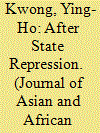

|
|
|
|
|
| Summary/Abstract |
The Chinese government has imposed the National Security Law which has resulted in Hong Kong formally entering into a phase of movement abeyance. By analysing 3377 posts on LIHKG Internet forum, this article re-explores the online protest attitude during this movement abeyance. The findings indicate that content creators are more attentive in regard to criticizing the legislation and pro-Beijing figures, followed by seeking international support and calling for unity. Users are more ‘participative’ in calling for mutual destruction between the authorities and people, initiating mutual support and seeking emigration. This study provides new perspectives on the study of movement abeyance.
|
|
|
|
|
|
|
|
|
|
|
|
|
|
|
|
| 2 |
ID:
147845
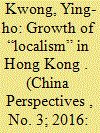

|
|
|
| 3 |
ID:
181906
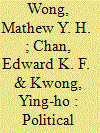

|
|
|
|
|
| Summary/Abstract |
This study examines the recent emergence of political consumerism in Hong Kong. Given its potential implications, we document the origin and maturation of this development and theoretically explain political consumerism from three perspectives: as a response to China’s economic intervention, as a form of identity politics, and as a new form of political participation. Drawing on original data collected from a representative survey of the local population, supplemented by interviews with stakeholders from the pro-democracy economic circle, we found that people who opposed China-Hong Kong economic integration and expressed a strong local (as opposed to national) identity tended to support boycotting. People who engaged in political consumerism were active in both legal and radical protests, pointing to the complementary nature of these different forms of activism. Further, by adopting a mediation analysis, we find that support towards the Anti-extradition Law Amendment Bill Movement only partially mediate the effect of the factors on political consumerism, suggesting that they are distinct development despite their shared origins. This article provides a novel perspective on the political polarisation in Hong Kong among consumer markets.
|
|
|
|
|
|
|
|
|
|
|
|
|
|
|
|
| 4 |
ID:
153689
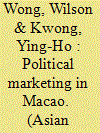

|
|
|
|
|
| Summary/Abstract |
To what extent can political marketing narrow the legitimacy gap for a hybrid regime? This article examines this question through the case of Macao (2009–14). It finds that political marketing is insufficient to compensate for lack of democratic reform and may easily backfire to expose the problem of a structural legitimacy deficit.
|
|
|
|
|
|
|
|
|
|
|
|
|
|
|
|
| 5 |
ID:
155225
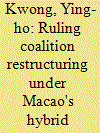

|
|
|
|
|
| Summary/Abstract |
The existing literature has long recognized that the postcolonial Macao government relies on traditional pro-Beijing associations to mediate state–society relations. However, the political significance of traditional associations has gradually been diminishing due to growing disconnection from the community, while some casino and construction tycoons have been establishing and sponsoring communal associations to mobilize societal support and expand their political influence. This article argues that the existence of ruling coalition restructuring is crucial to the postcolonial Macao government maintaining the persistence of its regime. The analysis indicates that tycoons use communal associations to build co-optation networks, defend government policies, fulfill political mobilization, and, more importantly, protect the current hybrid regime. The findings further show that the elite cohesion among the ruling coalition is maintained due to the Beijing government's coordination, although under the process of coalition restructuring. This article contributes to the literature by offering a casino-sponsored communal association perspective to understand contemporary politics in Macao, and provides an interesting case study of the democratization of a subnational regime.
|
|
|
|
|
|
|
|
|
|
|
|
|
|
|
|
| 6 |
ID:
192211
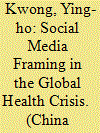

|
|
|
|
|
| Summary/Abstract |
Social media depiction of crises can mobilize people's support for or dissatisfaction with the government. By analyzing 3,799 videos, this study compares how pro-democracy and pro-regime opinion leaders framed the COVID-19 pandemic in Hong Kong. The results reveal that pro-democracy opinion leaders placed the primary blame for the crisis on the misadministration of the Hong Kong Special Administrative Region authorities, followed by attributing responsibilities to the Chinese authorities, and then suggesting opportunities for foreign penalties to be imposed on China. Pro-regime opinion leaders mostly criticize the opposition, denounce foreign countries, and seek to garner support for China. The conclusion strongly supports the thesis that opinion leaders and users from both camps actively engage with negatively framed content rather than positively framed content. Specifically, videos that frame foreign pressure on China demonstrate statistically significant explanatory power in relation to the engagement of prodemocracy users, while videos denouncing pro-democracy figures exhibit statistically significant explanatory power in regard to the engagement of pro-regime users. This article explores which negative topics can stimulate the audience's engagement and it compares the significant variations in framing strategies employed by either of the opposing factions when targeting their opponents. The case of Hong Kong illustrates how social media framing contributes to the emergence of "political extremism" in a polarized society.
|
|
|
|
|
|
|
|
|
|
|
|
|
|
|
|
| 7 |
ID:
148024
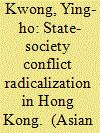

|
|
|
|
|
| Summary/Abstract |
Hong Kong has been facing an increasingly strong “anti-China” sentiment in recent years. More people are worried that existing Mainland-Hong Kong integration actually provides more opportunity for Beijing to exercise political control over Hong Kong, resulting in the loss of local identity. Political parties of the pan-democratic camp, which has been at the forefront of political activism since the 1980s, used to adopt a “milder” approach to oppose intervention from Beijing. However, with more Hong Kong people, especially localists, becoming sceptical towards this tactic, they have resorted to escalating things into “radical” protests or even bloody clashes with the authorities. During Chinese Lunar New Year 2016, a few hundred protesters joined the “Mong Kok Riot” and violently pelted police officers with bricks and glass, leading to more than 120 people being injured. The clashes may on the surface have been about hawker management issues, but, in fact, were fuelled by a growing discontent against the Chinese and Hong Kong Special Administrative Region governments. With more protesters prepared to take more radical actions against the authorities, state-society relations in Hong Kong are likely to enter an unprecedented period of tension.
|
|
|
|
|
|
|
|
|
|
|
|
|
|
|
|
| 8 |
ID:
180645
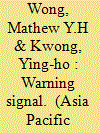

|
|
|
|
|
| Summary/Abstract |
This article examines the discourse of ‘Li's Field’ in Hong Kong, named after tycoon Li Ka-shing and used to satirically denounce the government-business political nexus. The discourse challenges the apparent reluctance of the weather agency to decide that a typhoon is strong enough to warrant a city-wide suspension of business activities, which would obviously be detrimental to capitalist interests. In comparison to the earlier period characterised by political trust, institutional and political factors in recent decades have intensified the impression of government-business collusion and the erosion of political trust. Li's Field is a case illustrating how political distrust can spill over into bureaucracy, challenging the traditions of bureaucratic neutrality and meritocratic and scientific policymaking. This article provides an analysis of the ‘field’ with primary interview data, media discourse analysis and secondary data. This study contributes by exploring political trust in politicians and bureaucrats, and how the former spills over into the latter.
|
|
|
|
|
|
|
|
|
|
|
|
|
|
|
|
|
|
|
|
|